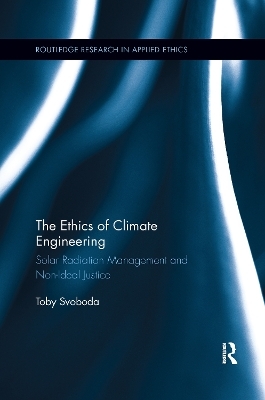
The Ethics of Climate Engineering
Solar Radiation Management and Non-Ideal Justice
Seiten
2020
Routledge (Verlag)
978-0-367-59505-0 (ISBN)
Routledge (Verlag)
978-0-367-59505-0 (ISBN)
This book analyzes the major ethical issues surrounding climate engineering. It focuses primarily on solar radiation management techniques for engineering the climate, such as injecting reflective aerosols into the stratosphere or brightening marine clouds. While such techniques might reduce some of the risks of climate change, they also raise e
This book analyzes major ethical issues surrounding the use of climate engineering, particularly solar radiation management (SRM) techniques, which have the potential to reduce some risks of anthropogenic climate change but also carry their own risks of harm and injustice. The book argues that we should approach the ethics of climate engineering via "non-ideal theory," which investigates what justice requires given the fact that many parties have failed to comply with their duty to mitigate greenhouse gas emissions. Specifically, it argues that climate justice should be approached comparatively, evaluating the relative justice or injustice of feasible policies under conditions that are likely to hold within relevant timeframes. Likely near-future conditions include "pessimistic scenarios," in which no available option avoids serious ethical problems. The book contends that certain uses of SRM can be ethically defensible in some pessimistic scenarios. This is the first book devoted to the many ethical issues surrounding climate engineering.
This book analyzes major ethical issues surrounding the use of climate engineering, particularly solar radiation management (SRM) techniques, which have the potential to reduce some risks of anthropogenic climate change but also carry their own risks of harm and injustice. The book argues that we should approach the ethics of climate engineering via "non-ideal theory," which investigates what justice requires given the fact that many parties have failed to comply with their duty to mitigate greenhouse gas emissions. Specifically, it argues that climate justice should be approached comparatively, evaluating the relative justice or injustice of feasible policies under conditions that are likely to hold within relevant timeframes. Likely near-future conditions include "pessimistic scenarios," in which no available option avoids serious ethical problems. The book contends that certain uses of SRM can be ethically defensible in some pessimistic scenarios. This is the first book devoted to the many ethical issues surrounding climate engineering.
Toby Svoboda is an assistant professor of philosophy at Fairfield University. He has published in journals such as Environmental Ethics, Environmental Values, and The Journal of Moral Philosophy. He is the author of Duties Regarding Nature: A Kantian Environmental Ethic (Routledge, 2015).
Introduction
Chapter 1: Benefits
Chapter 2: Distributions
Chapter 3: Decisions
Chapter 4: Virtues
Chapter 5: Dilemmas
Chapter 6: Comparisons
| Erscheinungsdatum | 01.07.2020 |
|---|---|
| Reihe/Serie | Routledge Research in Applied Ethics |
| Verlagsort | London |
| Sprache | englisch |
| Maße | 152 x 229 mm |
| Gewicht | 453 g |
| Themenwelt | Naturwissenschaften ► Biologie ► Ökologie / Naturschutz |
| Naturwissenschaften ► Geowissenschaften ► Geologie | |
| Naturwissenschaften ► Geowissenschaften ► Geophysik | |
| Technik ► Umwelttechnik / Biotechnologie | |
| ISBN-10 | 0-367-59505-2 / 0367595052 |
| ISBN-13 | 978-0-367-59505-0 / 9780367595050 |
| Zustand | Neuware |
| Haben Sie eine Frage zum Produkt? |
Mehr entdecken
aus dem Bereich
aus dem Bereich


